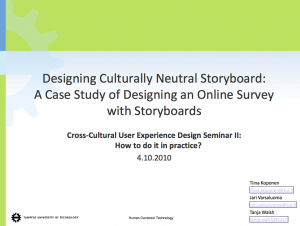In Module 1, we’ve examined whether or not technology is culturally neutral. Our readings and interactions thus far have indicated it is not. I have discovered online a case study by the Tampere University of Technology which examines the design of an online survey using what is described as a “culturally neutral storyboard.” Many of the questions related to social networking services. While not explicitly related to aboriginal education, I thought this tied in nicely with our module one discussion on the cultural neutrality of technology, particularly since it was using storyboards as a vehicle. Aboriginal history, being based on an oral tradition, I believe can likely identify more with storyboarding as their history is, indeed, based on a series of stories. It was interesting to note in this study the different reactions different cultural groups would give to certain storyboard images. For example, Indian respondents interpreted a bunch of friends on a beach to be a family gathering, whereas other cultural groups may interpret the gathering differently. The results of the study identified a few main findings, including the fact that storyboards helped respondents to understand difficult concept ideas and imagine themselves into the use situations, which made answering to the social networking services questions easier and fun. In addition, the storyboards themselves were well understood by users with different cultural backgrounds. The case study presentation can be found online here.
Tag Archives: Cultural Transmission
Aboriginal Education and The Digital Divide
The focus of my weblog entries from here forward will be to explore aboriginal access to technology by looking more closely at digital divide and digital literacy issues, discuss what is unique about aboriginal access and tie in the aboriginal tradition of story telling. My un-researched opinion currently is that I would guess that the digital divide in aboriginal communities is greater than in most other communities. I believe that the oral tradition of aboriginal communities, and the strong tradition of story telling has likely served as a backbone for culture history and because it has trumped the written word for so long it has also, perhaps, delayed the adoption of digital means of cultural transmission. As pointed out in our first module, however, these digital transmissions are not culturally neutral in of themselves. This is another aspect which can be tied into the discussion of aboriginal education and the digital divide. To this end, my next posting to share communally relates closely with this topic.
This survey completed by stats Canada in the winter of 2004 highlights deficiencies in internet access and online skills for aboriginals. This ties directly to the notion that the digital divide is more acute in aboriginal communities and will connect well with my research topic.

